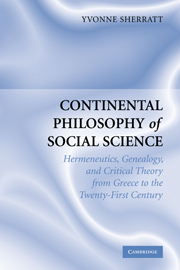Book contents
- Frontmatter
- Contents
- Preface
- Continental Philosophy of Social Science
- Introduction
- PART I THE TRADITION OF HERMENEUTICS
- PART II THE TRADITION OF GENEALOGY
- Introduction
- 6 The History of Genealogy: Nietzsche
- 7 Theory of Genealogy: Foucault
- 8 Applications of Genealogy
- PART III CRITICAL THEORY
- Conclusion
- Bibliography
- Index
7 - Theory of Genealogy: Foucault
Published online by Cambridge University Press: 23 November 2009
- Frontmatter
- Contents
- Preface
- Continental Philosophy of Social Science
- Introduction
- PART I THE TRADITION OF HERMENEUTICS
- PART II THE TRADITION OF GENEALOGY
- Introduction
- 6 The History of Genealogy: Nietzsche
- 7 Theory of Genealogy: Foucault
- 8 Applications of Genealogy
- PART III CRITICAL THEORY
- Conclusion
- Bibliography
- Index
Summary
Nietzsche himself is often neglected by continental philosophers of social science who all too frequently overlook the historical underpinnings of the modern discipline. However, the complexity and importance of the work of Nietzsche's disciple Michel Foucault cannot be fully appreciated without a familiarity with his German predecessor.
Michel Foucault has proved a pivotal figure for almost all branches of the twentieth and twenty-first century humanities. Sadly, his work, too, is often poorly depicted in sociology, human geography and cultural studies where Foucault is portrayed in scant theoretical style leading those from traditional disciplines to regard him as little more than a flippant peddler of some perfidious version of post-modernism. This would be a grave injustice as Foucault is perhaps the best-ever student of Nietzsche, appropriating a visionary analysis and applying it to his own society, with dramatic effect. Foucault was, in fact, the first person to correctly understand Nietzsche's genealogy and to apply it with new potency. If Nietzsche's genealogy was directed towards an understanding of nineteenth-century morals, Foucault appropriated this same nominalist, historical approach and deployed it in understanding the features of twentieth-century European society.
Michel Foucault, the flamboyant French philosopher with characteristic shaven head is familiar to us all. Born in Poitiers in 1926, he died in 1984. The Ecole Normale Superieure was where he studied from 1946 and he held various posts thereafter throughout France, most notably in the College de France from 1969.
- Type
- Chapter
- Information
- Continental Philosophy of Social Science , pp. 143 - 164Publisher: Cambridge University PressPrint publication year: 2005



